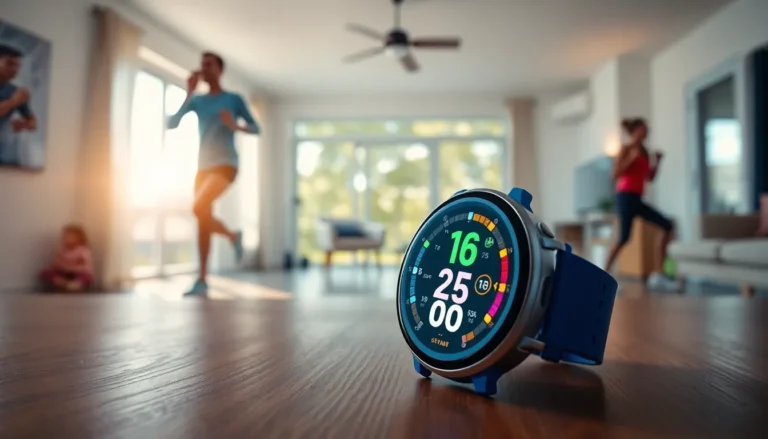Imagine a world where clinical trials are as easy as slipping on your favorite pair of sneakers. Enter clinical trial wearables—those nifty gadgets that not only track your steps but also collect crucial health data. These devices are revolutionizing the way researchers gather information, making trials more efficient and, dare we say, a bit more fun.
Table of Contents
ToggleOverview of Clinical Trial Wearables
Clinical trial wearables consist of advanced devices designed to monitor health metrics during research studies. These gadgets track vital signs such as heart rate, blood pressure, and glucose levels. Each device collects continuous data, enhancing researchers’ ability to analyze patient health over time.
Efficiency characterizes the deployment of these devices in trials. Participants can wear them comfortably, allowing for passive data collection without interrupting daily activities. Data integrity improves due to real-time monitoring, providing a more accurate picture of patient responses to treatments.
Various types of wearables exist in the market. Smartwatches, fitness trackers, and biosensors function effectively in clinical settings. Each device type caters to specific research needs, making it easier to gather targeted data.
Compliance remains a significant advantage of clinical trial wearables. Participants are more likely to adhere to study protocols when devices seamlessly integrate into their lifestyles. Greater retention rates arise from reduced burden and increased engagement.
Data security plays a crucial role in the use of wearables. Advanced encryption protocols ensure the protection of sensitive health information. Regulatory compliance remains essential, with guidelines from entities like the FDA governing data collection practices.
Enhanced collaboration between researchers and participants stems from the use of these devices. Wearables facilitate better communication regarding health outcomes and treatment effects. Ultimately, they help bridge the gap between traditional clinical trials and modern digital health solutions.
Benefits of Clinical Trial Wearables

Clinical trial wearables offer significant advantages in clinical research settings. Their ability to efficiently gather valuable data leads to improved studies and outcomes.
Enhanced Data Collection
Collecting health data continuously provides researchers with insights previously difficult to obtain. Advanced sensors monitor metrics like heart rate, activity levels, and sleep patterns, generating comprehensive profiles. This consistency yields high-quality data, enhancing statistical power. Wearables automatically upload information to secure databases, reducing human error associated with manual entries. Researchers access real-time analytics, enabling them to track participant health and adjust protocols as necessary. The integration of these devices allows for nuanced assessments, bolstering the overall validity of trial findings.
Improved Patient Compliance
Patient adherence often improves with the use of wearables. Participants find it convenient to wear devices that blend seamlessly into their daily routines. Gentle reminders and notifications from these gadgets encourage consistent use and timely reporting of data. Comfortable designs mean participants are less likely to experience discomfort or disruption in daily life. This approach cultivates a sense of engagement and ownership in the trial process. Enhanced communication channels via wearables foster relations between participants and researchers, increasing motivation to comply with study protocols.
Types of Clinical Trial Wearables
Clinical trial wearables come in several forms, each designed to serve specific research functions effectively. Their unique characteristics enhance data collection processes.
Wearable Sensors
Wearable sensors monitor various health metrics, such as heart rate and temperature. These devices provide continuous data, enabling researchers to gather real-time insights. Examples include ECG monitors and glucose sensors. Data from wearable sensors streamline patient evaluation, leading to faster analysis. They’ll improve understanding of conditions over time, enhancing clinical decision-making. Researchers appreciate the accuracy and detail that these sensors contribute to clinical trials.
Smart Devices
Smart devices encompass advanced technologies like smartwatches and fitness trackers. These gadgets track physical activity, sleep patterns, and vital signs simultaneously. Incorporating notifications and alerts engages participants in their health monitoring. Many smart devices sync effortlessly with mobile applications, allowing for easy data access. Researchers utilize this connectivity to analyze patterns and trends effectively. Smart devices enhance participant experience, making clinical trials more accessible and user-friendly.
Challenges in Implementing Clinical Trial Wearables
Implementing clinical trial wearables involves navigating several challenges that can impact their effectiveness and acceptance.
Data Privacy Concerns
Data privacy remains a primary challenge. Participants worry about the confidentiality of their health data. Regulations like HIPAA require strict adherence to privacy standards, making compliance complex. Sensitive information can become vulnerable if not properly secured. Researchers must utilize encryption and secure data storage to safeguard this data. Transparency about data usage also helps build trust among participants. Organizations should establish clear communication about how data will be utilized and who will access it.
Technical Limitations
Technical limitations pose additional hurdles. Wearable devices often rely on consistent connectivity to function effectively. Poor device integration can lead to data gaps or inconsistencies. Battery life can present issues, especially during long trials. Dependence on user interaction may affect data accuracy, as participants may forget to wear the devices. Software compatibility also varies, causing challenges in data synchronization. To mitigate these issues, developers must prioritize user-friendly design and reliable technology that seamlessly integrates into participants’ lives.
Future Trends in Clinical Trial Wearables
Emerging technology significantly influences the development of clinical trial wearables. Increasingly, artificial intelligence integration enhances data analysis capabilities, allowing real-time insights from collected health metrics. Researchers expect this advancement to streamline decision-making processes and improve study outcomes.
Patient-centric designs gain priority as developers strive for wearables that enhance comfort and usability. Adaptations like longer battery life and more versatile sensors become standard, accommodating diverse participant needs. Moreover, incorporating user feedback shapes the evolution of these devices, ensuring that wearables align closely with patient experiences.
Data interoperability poses another focal point for future trends. Seamless communication between different wearable devices and health platforms promotes collaboration among stakeholders. As systems grow more integrated, researchers benefit from comprehensive data sets that support robust statistical analysis.
Additionally, enhanced data security features address ongoing privacy concerns. Advanced encryption methods and user-controlled consent mechanisms instill confidence among participants regarding their health information. Researchers understand the importance of transparency in data usage, aiming to build a trustworthy relationship with trial participants.
Finally, wearables are set to play a crucial role in remote clinical trials, evolving in response to shifts toward decentralized research. Digital health solutions using wearables facilitate participation from diverse geographical locations. As technology continues to advance, clinical trial wearables become pivotal in transforming research methodologies and improving participant engagement.
Clinical trial wearables are revolutionizing the landscape of medical research. By providing continuous health data collection in a user-friendly format, these devices enhance the efficiency and accuracy of clinical trials. Their design not only improves participant compliance but also fosters a collaborative environment between researchers and participants.
As technology advances, the integration of artificial intelligence and improved data security measures will further enhance the capabilities of wearables. This evolution promises to address existing challenges while promoting a more patient-centric approach in research. With the potential to facilitate remote trials and broaden participation, clinical trial wearables are set to play a pivotal role in the future of medical research.









